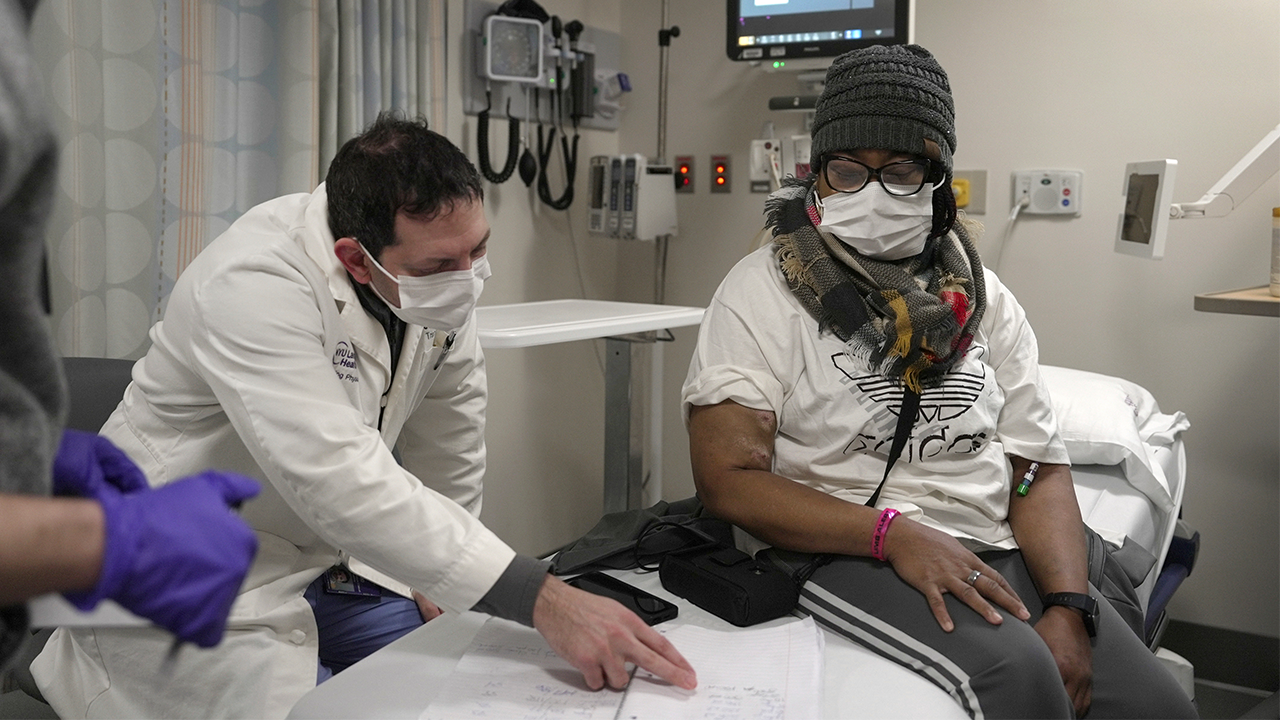An Alabama woman who is the only living recipient of one pig organ transplant Passed a major milestone on Saturday when she became the tallest living person with a functioning pig organ.
Towana Looney, 53, remains healthy and full of energy, reaching the record of 61 days on Saturday with her pig kidney.
“I’m superwoman,” Looney told The Associated Press. “It’s a new perspective on life.”
Only four other Americans have received experimental transplants of gene-edited pig organs—two received a heart while the other two received a kidney—but none lived more than two months.
Woman Receives Pig Kidney Transplant, Walks Out of Hospital Days Later: ‘Second Chance’

Towana Looney, who received a kidney transplant in November 2024, talks about notes about her recovery with Dr. Jeffrey Stern at NYU Langone Health in New York, Friday, January 24, 2025. (AP)
“If you saw her on the street, you would have no idea that she is the only person in the world walking around with a pig organ inside them that is functioning,” said Dr. Robert Montgomery of NYU Langone Health, who led Looney’s transplant.
Montgomery said Looney’s kidney function is “absolutely normal.” She has remained in New York temporarily so she can receive post-transplant checkups, but doctors hope she can return to her home Gadsden, ALin about a month.
“We’re pretty optimistic that this will continue to work and work well for, you know, an important period of time,” Montgomery said.
Scientists are genetically altering pigs so their organs are more human to support a severe shortage of human organs that can be used for transplants.
More than 100,000 people are on the U.S. transplant list. Most of these people need a kidney and thousands are dying waiting.
The Food and Drug Administration only allows pig organizations in special circumstances for people who have run out of other alternatives.
Dr. Tatsuo Kawai of Massachusetts General Hospital, who led the world’s first pig kidney transplant last year and is working with another pig developer, Egenesis, said how good Looney is a “very precious experience.”

Towana Looney sits for an NYU Langone Health press conference on Tuesday, December 17, 2024. (Fox News)
Looney was much healthier than previous recipients of the pig organ, according to Kawai, who said her progress will help inform doctors of future efforts.
“We have to learn from each other,” he said.
Looney donated a kidney to her mother in 1999 and subsequent pregnancy complications caused high blood pressure that damaged her remaining kidneywhich ultimately failed, a rare circumstance among living donors.
She spent eight years on dialysis before doctors determined she was unlikely to receive a donated organ because she had developed very high levels of antibodies to be abnormally ready to attack another human kidney.
Looney, looking for an alternative, wanted to try the experiment with pig organs. No one knew how it would work in someone “highly sensitized” with the overactive antibodies.
Montgomery’s team has closely monitored Looney’s recovery with blood tests and other measurements since the Nov. 25 surgery. About three weeks after the transplant, subtle signs that rejection was beginning were discovered. They knew to look for these signs because of a 2023 experiment when a pig’s knee worked for 61 days in a deceased man whose body was donated for research.

Outside the entrance to NYU Langone Health Emergency Room on April 6, 2020 in New York City. (Noam Galai/Getty images)
Click here to get the Fox News app
Montgomery said his team successfully treated Looney and there have been no signs of rejection since.
It’s impossible to predict how long Looney’s new kidney will work. But if it failed, she could receive dialysis again.
“The truth is, we don’t really know what the next hurdles are because this is the first time we’ve gotten this far,” Montgomery said. “We really need to keep an eye on her.”
The Associated Press contributed to this report.



